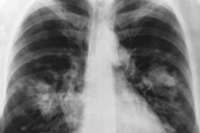Early trip to the GP gives big boost to lung cancer patients

A powerful campaign urging people with a three week old cough to get checked out by their doctor has resulted in a dramatic rise in the number of lung cancers detected earlier according to an analysis of the results announced by Cancer Research UK today.
Experts say this will offer patients their best chance of life-saving surgery and longer survival for the biggest cancer killer.
The hard-hitting Be Clear On Cancer Campaign led to around 700 extra patients being diagnosed with lung cancer - many at an early stage – and resulted in around 300 more patients getting surgery which gives them the best chance of prolonged survival.
The Public Health England campaign which is supported by Cancer Research UK, NHS England and the Department of Health, ran throughout England from May-June 2012. People were urged to go to the GP if they had a cough lasting longer than three weeks.
As a result almost 10 per cent more people (around 700) were diagnosed with lung cancer than in the same months the previous year and around 400 more patients had their lung cancer picked up at an early stage – the earlier cancer is detected the more likely treatment is to be successful. There was also a significant decrease in the proportion of people diagnosed at a late stage.
And best of all around 300 more of those diagnosed received surgery which is vital for better survival.
Dr Mick Peake, lung cancer expert and consultant in respiratory medicine at the University of Leicester, said: "We are starting to see a dramatic change in potentially curative treatments for lung cancer. As a result of the Be Clear on Cancer campaign we've seen as much progress, particularly in the proportion of patients having an operation for their lung cancer, in those three months as in the previous two years."
Dr Harpal Kumar, chief executive of Cancer Research UK, said: "It is great news that this campaign has raised awareness of lung cancer symptoms among those most at risk of the disease. By acting quickly if you notice a possible symptom, you can give yourself the best chance of survival. In many cases it won't be cancer, but it is better to be sure and, if it is cancer, to detect it earlier rather than later.
"Earlier diagnosis, combined with the pioneering research that brings better and kinder treatments to patients, means we are starting to make much needed headway against a type of cancer that has killed millions. This vital combination will help bring forward the day when no one dies prematurely from lung cancer."
Sean Duffy, National Clinical Director for Cancer at NHS England, said: "Until recently a lung cancer patient in Sweden was nearly 70 per cent more likely to survive their disease for at least five years than if they lived in England. So I am therefore delighted that this new set of figures shows that the Be Clear on Cancer campaign has helped speed up our progress in lung cancer survival with hundreds of patients receiving potential life saving surgery as a result of this campaign"
Professor Kevin Fenton, Director of Health and Wellbeing at PHE, said: "To see such encouraging results from the first national Be Clear on Cancer lung campaign is very reassuring. It shows that we can make a difference when it comes to one of the biggest cancer killers. Public Health England is committed to helping prevent and diagnose cancers earlier. We are now looking to re-run the campaign in 2014 which we hope will improve survival for even more patients."















